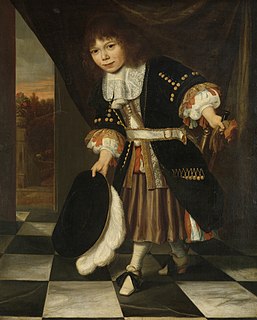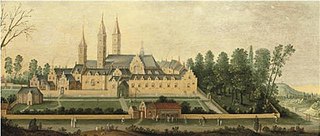
Abraham Bloemaert was a Dutch painter and printmaker in etching and engraving. He was initially working in the style of the "Haarlem Mannerists", but in the 16th century altered his style in line with the new Baroque style that was then developing. He mostly painted history subjects and some landscapes. He was an important teacher, who trained most of the Utrecht Caravaggisti, at least for a period.

Jan Dirksz Both was a Dutch painter, draughtsman, and etcher, who made an important contribution to the development of Dutch Italianate landscape painting.

Cornelis van Poelenburgh or Cornelis van Poelenburch, was a Dutch landscape painter and draughtsman. He was the leading representative of the first generation of Dutch landscape painters who were active in Rome in the early 17th century. He was known for small-scale paintings depicting Italianate landscapes with small figures enacting biblical or mythological scenes or in contemporary attire.

Francois (Frans) Verwilt was as a Dutch Golden Age landscape painter.

Dirk van Hoogstraten (1596–1640) was a Dutch Golden Age painter, and father of Samuel Dirksz van Hoogstraten.

Joris Abrahamsz. van der Haagen was a Dutch Golden Age painter specialized in landscapes.

Johannes (Jan) van Haensbergen (1642–1705) was a Dutch Golden Age painter.

Jacob van der Does was a Dutch Golden Age landscape painter.

Elias van den Broeck was a Dutch Golden Age flower painter.

Johannes Glauber, was a Dutch Golden Age painter.

Gerrit Claesz Bleker, was a Dutch Golden Age painter.

Pieter van der Hulst, was a Dutch painter of portraits, still lifes, forest still life, game pieces and animal paintings.

Claes Jacobsz van der Heck, was a Dutch Golden Age painter.
Jan van der Lijs, was a Dutch Golden Age landscape painter.
Daniel Vertangen, was a Dutch Golden Age painter.
Dirk Stoop was a widely travelled painter and engraver of the Dutch Golden Age. Alternative versions of his name include Dirck Stoff, Theodorus Stoop, Thierry and Rod(e)rigo, by which he was known in Portugal.

Cornelis Liefrinck was a Dutch Golden Age landscape painter.
Aernout Elsevier (1579–c.1656) was a Dutch Golden Age landscape painter.

Domenicus van Wijnen was a Dutch Golden Age painter.

François van Knibbergen, was a Dutch Golden Age landscape painter.
















